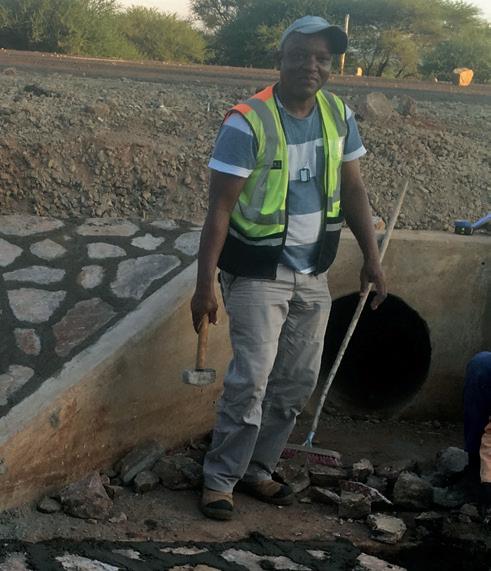
6 minute read
Tiberius Community Proud of Quality Road Built on Own Sweat
from Mmileng Issue 4/2020
by dabasspty
The upgrading, from gravel to bituminous (tarred) surface, of road D3556 in Tiberius within the Mogalakwena Local Municipality of the Waterberg District was a united front involving 12 villages, 23 local SMMEs and 44 local labourers. Among the benefits of the new road is improved access for the community to amenities such as the Tiberius Clinic, a primary healthcare facility in the village.
he relationship between infrastructure contractor and the community is often one mired in mistrust, especially around on-time remuneration of labourers. Construction companies are often, unfairly so, likened to the proverbial caravan that make a stop only to exploit dispensable labourers and move on.
Advertisement
Companies are often described as lacking compassion and abusing their impersonal power, but for 55-year-old Koena Johanna Shogole from the village of Tiberius, what she experienced from an appointed Roads Agency Limpopo (RAL) contractor and strength in unity between community members from neighbouring villages was sincerity and humanity on another level.
Her company, MBKM Holdings, named after the initials of her children, herself and her husband, was one of the twenty-three (23) local Small, Medium and Micro Enterprises (SMMEs) engaged by contractor Hillary Construction, in the value chain of delivering a 7-kilometre upgrade project, from gravel to bituminous (tarred) surface, on road D3556 in Tiberius within the Mogalakwena Local Municipality of the Waterberg District.
Mrs Shogole’s company specialises in events, and she provided catering during monthly meetings and toilet rental for the duration of the contract period.
Married into Tiberius, she was widowed during the course of the contract period. She had to endure a barrage of make-believe superstitions, cultural taboos and religious doctrine advanced by sections of her adopted community that circled her contract opportunity like vultures during her time of bereavement, her most vulnerable state. Job opportunities are often highly contested when they come to communities.
According to every subcontractor and labourer interviewed, the contractor scored high in terms of on-time payments during the contract. And for Mrs Shogole, it was also the human touch that she received from unlikely sources that, well, touched her.
“If it were not for the support and protection from community members from neighbouring villages and the people at Hillary (contactor), especially Johan, I would not have seen the contract through,” she said appreciatively.
Notwithstanding, she was able to see the contract through feeding between twenty and thirty mouths per meeting she catered for, with the
Joseph ‘JoJo’ Ramashitja, 47, owns Mosima Matena Trading and Projects, which was one of the three SMMEs engaged in the construction of drainage structures on road D3556 in Tiberius.
of the contract period.
As a caveat though, the employment of SMMEs ought to the Tiberius road project, over-achieving on its contractual required amount of R13.6m by an impressive 33.5%.
stop to this sense of entitlement that can be disruptive”. “Advise local people looking to be absorbed into the project about the advantages and disadvantages, which activities need experience and which don’t really require (much) experience, and so on,” he advised. Another subcontractor Mooki Dolo, also 50 years old, who co-owns Kgabo-Mooka General Trading with Kgabo Lamola (38), said he is grateful and appreciative of the subcontracting opportunity his company got working on a RAL project for the first time. “We got in with at Grade 1 level (Construction Industry Development Board), and the experience gained on this help of her two support staff. She also hired two workers in the toilet help us to apply for higher grading level,” said Mr Dolo. hire division. All four, two women and two males, were from Tiberius. Kgabo-Mooka was one of three small businesses
She said after the project had ended, and the easing of restrictions contracted to construct drainage structures, such as around gatherings by the national government on its management of culverts, headwalls and wing walls, and part of gabions, Covid-19 pandemic, business is picking up and her company is starting kerbs and stone pitching, along road D3556. to get bookings as people are back to organising events. The Polokwane-based company came in with two skilled
Successful contract bidder Hillary Construction, as per RAL policy workers and had to give work opportunities to twelve in line with the (Department of) National Treasury Preferential community members from Tiberius. The twelve (12) local Procurement Regulations of 2017, was expected to sub-contract a labourers were part of the 38 community members given minimum of 30% of contract value, as this was an upgrading project, to Construction Education and Training Authority-accredited small businesses in villages adjacent to the project site for the duration on-the-job training on the project.
be limited to the locality of Limpopo Province with “…THE EXPERIENCE GAINED preference given in the priority order of, first to the SMMEs from affected villages, then to those within the local ON THIS PROJECT AND FUTURE municipality before exploring the district municipality and OPPORTUNITIES STEMMING FROM so forth. In this regard, the project over-achieved on its target for THIS WILL HELP US TO APPLY FOR the employment local small businesses. An amount of R18.2 million was spent on the employment of small businesses on HIGHER GRADING LEVEL.” project and future opportunities stemming from this will
Count Molwantwa from the neighbouring Diphichi village was Mr Dolo also rated the relationship between the main subcontracted, through his company Ramohomana & Sons (Pty) Ltd, contractor and subcontractors on the project as, “very good, to provide traffic accommodation (road traffic control around and smooth”. construction zone) for the entire twelve-month project duration. He, however, said the project could have done with
The 46-year-old said he learnt a lot from his involvement on the better communication from the Project Steering Committee, project, particularly the invaluable lesson of managing people, as he and support for subcontractors who are getting jobs for the had to give opportunities to people from about a dozen villages. first time or after a while and as such have no equipments
“I had to rotate about 54 flagmen at one time, mostly youth and and capital or cash reserves. women,” said Mr Molwantwa. One of the challenges for the Agency’s successful SMME
As for 50-year-old Henry Makhafula from Tiberius, he came in with empowerment programme remains the lack of financial one permanent employee and gave contract opportunity to two young acumen and ownership of the required equipments by small local drivers, through his company KotsiyaKhafs Trading Enterprise players to execute projects. For this reason, RAL is working 101 that provided plant hire and transportation of employees for nine tirelessly to sign deals to support and empower small main months on the project. contractors and subcontractors.
He spoke highly of how the contractor was able to handle and RAL has spent R661 million on village-based SMMEs resolve complaints without them escalating. Mr Makhafula also said in the six years since its 2014 rebirth. This is an he’d wish for local people to be educated more on the various activities overachievement by R130m considering the target set for and stages in the road infrastructure construction process to “put a the five-year period 2015/16 to 2019/20 was R531m. m











